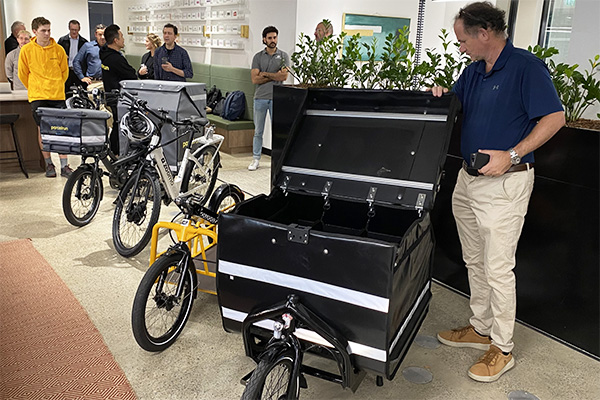Sydney’s e-cargo bike delivery trial has launched!
And riders in bright yellow hoodies on e-cargo bikes are proving an important point.
Namely, that for short distances (5km or less) micromobility outperforms larger trucks and vans in delivering lighter loads. In fact, in the first week, Ben from Parcelrun delivered 18 parcels in an hour! This is the unique proposition that is already a proven, successful business model in Europe and the UK.
The Parcelrun launch at Shippit HQ: Ben sports the Lug + Carrie Tern e-cargo bike, with a Zoomo e-bike and a heavy-duty custom-built trailer in the background (Image: Bicycle NSW)
And, according to Glynn Barton, Transport for London COO addressing the E-Mobility Live panel discussion: “The UK Department of Transport is now planning to legislate for logistics to deploy e-cargo-based freight for last mile deliveries.”
“Congestion, climate change and road safety are all massive challenges,” says Patrick Ibrahim, Parcelrun’s founder and CEO. “And I want Parcelrun to be at the forefront of a new generation of logistics companies striving to solve some very sticky urban problems.”
Peter McLean (Bicycle NSW), Sandy Bains (Shippit), Patrick Ibrahim (Parcelrun) and Brad Lorge (Premonition + Shippit) discuss the challenges and opportunities for last-mile delivery in dense cities (Image: Bicycle NSW)
Parcelrun aims to do that by demonstrating the impact of a safe, efficient zero-emissions delivery model. “Not just in terms of profitability, which is huge - we’re talking a more than 50% uptick over diesel van delivery. But there are significant quality of life and environmental improvements offered by sustainable transport,” says Patrick.
“We’re really grateful to Transport for NSW for providing the use of the Goulburn Street Courier Hub to base our operations. And for the support we’ve received from partners like Shippit, Lug + Carrie, Zoomo and
Bicycle NSW.”
How does e-mobility compete with traditional freight in cities?
As soon as logistics operators consider the advantages, it’s actually not a competition. Instead, it’s an invitation to do something better.
“When looking at traditional modes, you’re talking about 6 jobs per hour - that’s it! But we’re planning an achievable average 12-18 drops. Then there’s the equipment savings of running $13,000 e-cargo bikes on zero fuel and parking costs. Versus $30,000+ vans with fuel, parking and looming emissions costs,” says Patrick Ibrahim. “Whilst this is not a unique model, it’s the first of its kind in Australia.”
Not bad for a bike: Professor Stephen Greaves, Professor in Transport Management at the Institute of Transport & Logistics Studies at University of Sydney, inspects the Larry v Harry Dutch Cargo ‘Bullet’
(Image: Bicycle NSW)
Beating the last mile black hole
The last mile represents a massive financial burden for operators due to congestion and fuel inefficiencies. And for people and places, there are major safety concerns, noise, loss of amenity and deadly traffic emissions.
As Dr Elliot Fishman, Institute for Sensible Transport, and guest panellist at E-Mobility Live pointed out: “54% of delivery costs are derived from the last mile.” This is mainly due to traffic congestion. In cities, trucks and vans are limited to where they can go. “Then there’s parking and all the additional time and effort carting, loading and unloading your stuff,” said Dr Fishman.
By 2030, Sydney’s congestion cost is tracking towards $12.6 billion while logistics demand will grow between 20-30% globally
“Given parcels travel an average of 700km across Australia, we see a solution for multiple delivery partners, especially last mile,” says Sandy Bains, Head of Strategy and Operations, Shippit
“This is a great development for the future of sustainable transport in Sydney,” says Peter McLean, Bicycle NSW CEO. “Quieter, cleaner human powered logistics will help make our cities and towns safer and more liveable. With great examples abroad, we’re confident that the Sydney trial will beat expectations.”
The other positive outcome of switching deliveries to e-cargo bikes is that the call for better infrastructure to support active transport will grow louder. There is a clear social, environmental and business case for active travel. We now need the political will to fund it.
Precious cargo: The importance of e-cargo delivery spells out the social need for investment in better active transport infrastructure (Image: The Guardian)
If you love e-mobility…
We’d love you to join Bicycle NSW and support our advocacy for better infrastructure. You will also ride easy, covered by our comprehensive insurance and enjoy many other Member-only benefits.





